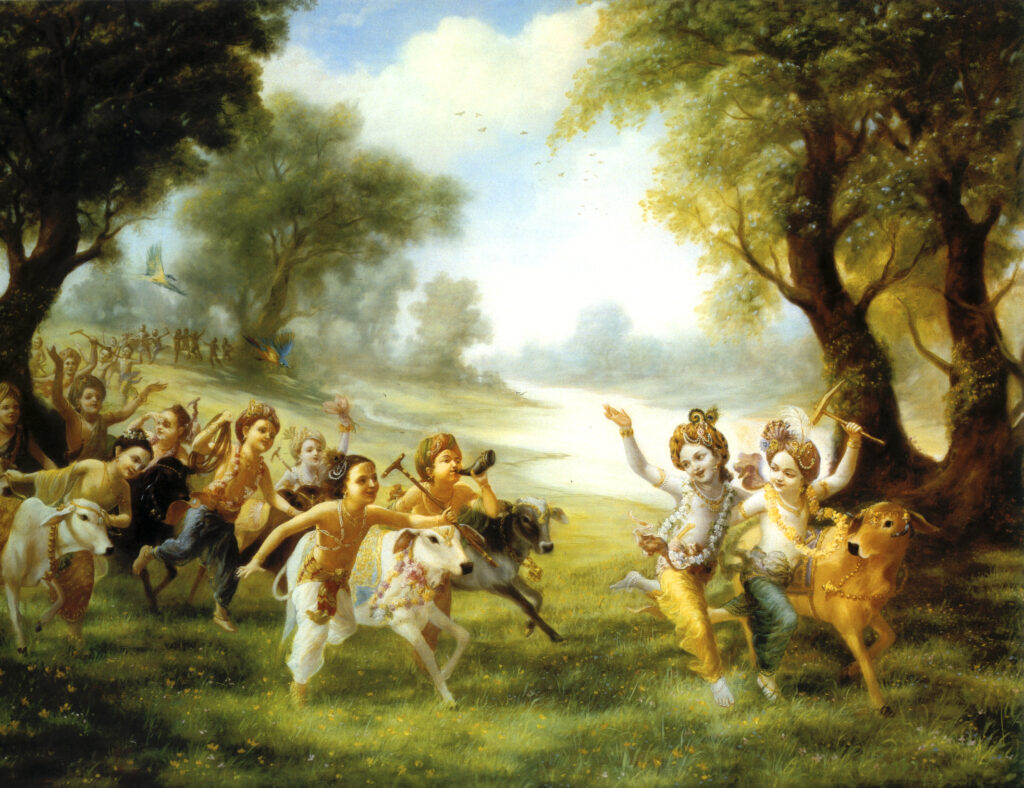
One famous singer related that as a child in school he was once asked “What do you want to be when you grow up?” His reply was “Happy. I want to be happy.” And this is the goal of everyone, more or less: to find lasting happiness. We all seek pleasure and try to avoid suffering, but we are not all powerful and as it says in the Bhagavad-gita [2:14] the “appearance of happiness and distress, and their disappearance in due course, are like the appearance and disappearance of winter and summer seasons.” At times everything is going fine and we’re riding the crest of the wave. Other times we’re hurtling down the face of the wave towards the trough with ten tons of white water about to crash on top of us – we’re just trying not to drown. Sometimes it’s a real struggle just to exist.

In 1785, the Scottish poet Robert Burns wrote a beautiful poem called “To a Mouse.” Burns was a farmer, and after he had harvested his summer grain crop, before the field was laid fallow for winter, he ploughed the stubble back into the field.

His plough broke open the home of a mouse, who fled in terror. Burns, who himself had a very difficult life, felt sadness for the mouse, who had laboured all summer, creating a home, lining it with leaves and stubble, and storing up grains and seeds so that it could survive the harsh Scottish winter which was fast approaching. He remarked that the mouse had done all it could to ensure that it would survive winter, and now it was cast out without home or food. Burns commented:
But Mouse, you are not alone,
In proving foresight may be vain:
The best-laid schemes of mice and men
Go oft awry,
And leave us nothing but grief and pain,For promised joy!

We are not in control of our destiny, and we do not know what karma has in store for us. Just like this poor mouse, people make so many plans, set themselves so many goals for what they feel they need to achieve in life to be happy. Maybe they are to do with having a successful career. Perhaps they involve having a loving family life and owning a nice home with all the comforts and gadgets and stuff they desire, or to travel. Definitely we want to be loved and have friends, and we have various intellectual and sensual pleasures we feel we need to be happy. There is a common saying “You only live once, so enjoy it while you can.” The idea is that you are your body and therefore you will cease to exist when your body dies, so you may as well suck in all the pleasure you can before you’re gone forever.
The Vedic yoga texts and other scriptures of the world, as well as countless great saintly teachers, refute this idea. While they agree that the body you are wearing is only temporary, they clearly explain that you are not your body but the eternal spirit soul who dwells within this material shell. If I was my body, just a complex collection of material particles, then it would make sense that union with other material particles could give me satisfaction. But as some famous wealthy hedonists have pointed out, “I can’t get no satisfaction.”
James Packer is one of the richest men in the world. He socialises with presidents, prime ministers, billionaires, famous singers, models and movie stars across multiple countries. In Hollywood, he counts screen legends Tom Cruise, Warren Beatty and Robert de Niro as friends. He owns homes all around the world in exotic locations. But a few years back he said:
I think I’m a psychologist’s wet dream – who knows why the mind does what the mind does? How can it be that one day you wake up and feel happy and the next day you wake up and it looks the same and you feel sad?

We have so many examples of rich, famous, apparently successful people – millionaires, film stars, famous musicians, models and sports stars etc. committing suicide or resorting to heavy drugs or becoming alcoholics, sex or gambling addicts and leading miserable lives. If they were the body then they should be happy, because they have all that is necessary for the satisfaction of the senses. The reason they are not satisfied is because just as the body needs food to keep it alive and healthy, so the soul also needs nourishment – spiritual food – to keep it enlivened and happy.
The soul is described in Vedic scripture as sat-chit-ananda. Sat means eternal. Chit means full of knowledge and ananda means always blissful. So being blissful is actually our natural condition, and this is why we all crave happiness. Without spiritual food, spiritual happiness, no one can feel truly alive, truly happy, truly blissful. Without the spiritual happiness or ananda of yoga – union of the individual soul with the Supreme Soul – there can be no platform of lasting peace and happiness. In the most famous Vedic yoga text, the Bhagavad-gita, Krishna states:
One who is not in transcendental consciousness can have neither a controlled mind nor steady intelligence, without which there is no possibility of peace. And how can there be any happiness without peace?
[Bhagavad-gita 2:66]
So, if we are intelligent, we will begin to realize that to find real happiness I must look within. First of all, I need to calm the mind and attain some peace. With peace as a foundation, I can then start to increase my inner happiness, rather than desperately chasing the shallow and flickering temporary happiness that comes from sense flashes. I need a deeper lasting happiness to be truly satisfied, and if I understand that I am an eternal spirit soul, a spark of the Supreme Soul, then it makes sense that union with the Supreme Soul rather than union with matter is the source of perfect happiness. The famous author C.S. Lewis [Chronicles of Narnia] understood this point, saying:
God cannot give us a happiness and peace apart from Himself, because it is not there. There is no such thing.
When I first came across this bhakti yoga process, I was twenty years old. I was a hippy – this was the early 70’s. Being a hippy you always had to act like you were peaceful, cool and full of love. “All you need is love” as the Beatles song went. But beneath the surface I was empty and full of anxiety, anger and frustration. I was actually incapable of loving others because I was too selfish. As a peaceful hippy I was a phony. I was actually lost and tried to mask these feelings of emptiness by smoking lots of dope. Looking back, behind the cool veneer I was actually very unhappy.
I had seen that my parents were kind people who were generous to their family and friends. Both worked very hard to have a nice home with the latest TV and all the other gadgets and trappings of success. But I knew that they were not deeply happy – they had their anxieties, their fears and their insecurities. As they got older, I saw their fears and insecurities increase. They retreated into the past and talked of “the good old days” as if nothing in their later life was exciting or interesting. I liked them but I didn’t want to be like them. I wanted a deeper happiness. I knew that the life my parents lived was not enough to make me happy.
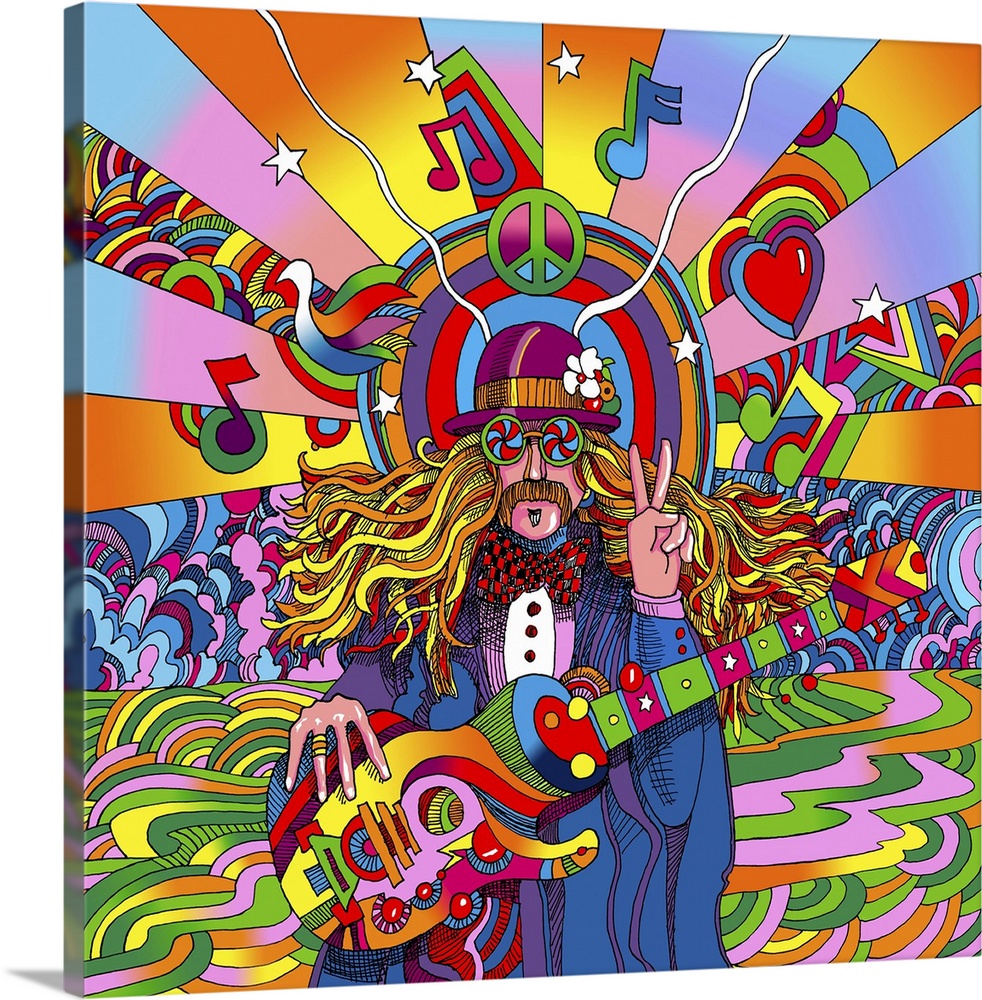
I had this gnawing suspicion that there must be more to life. Like countless thousands of other so-called hippies, I rejected what I saw as material life but had nothing much of value to replace it with. We may have rejected the accumulation and over-consumption of material goods, but we were generally more hedonistic with worse moral standards than our parents. So, despite all the so-called “consciousness expanding” drugs and the cool hippy veneer, I was actually lost, empty and full of anxiety. The hippies’ peace and love were just an illusion. hippieness didn’t equate to happiness.
Then I met my spiritual teacher and I could tell “this person is deeply fulfilled and he genuinely loves and cares for others.” And I was amazed at his wisdom – he had a perfect answer to every question.
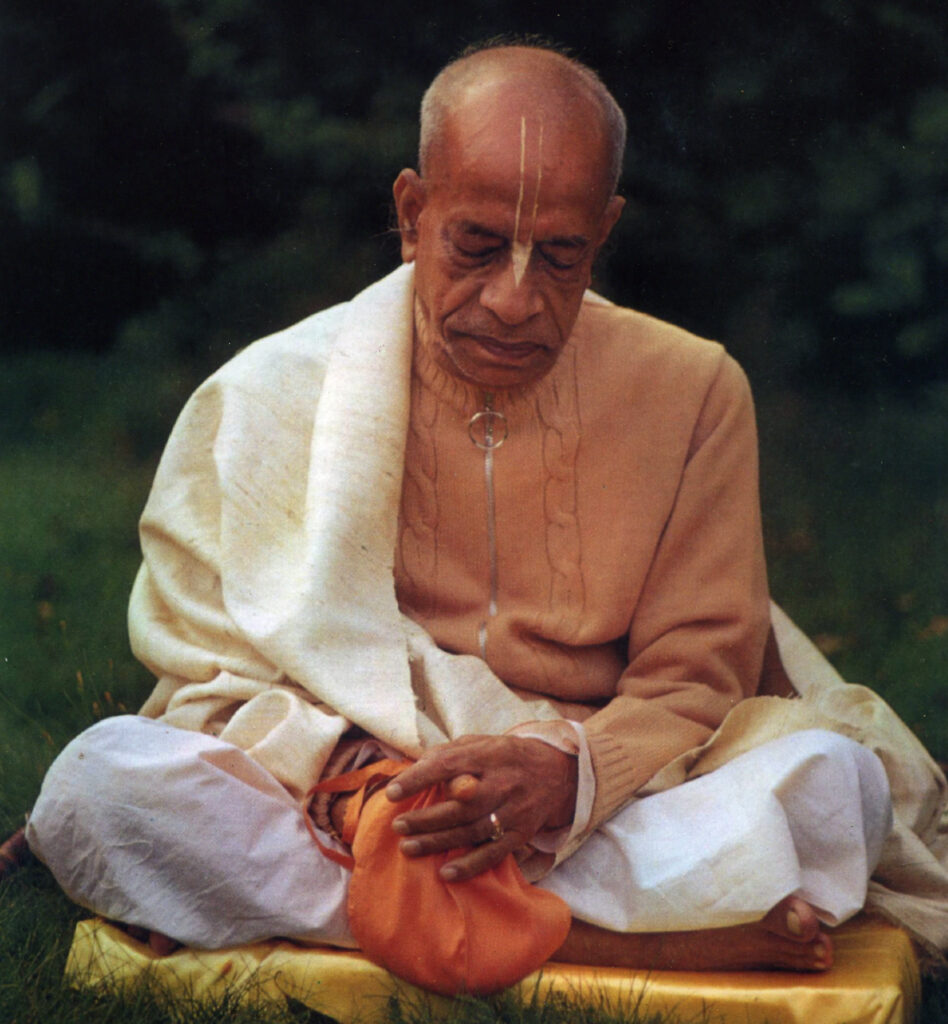
I started chanting these mantras as he recommended and attempted to practice this yoga philosophy and gradually my life changed. I’ve been doing this for forty-nine years now and there’s no way I could bear to stop today. This mantra meditation process has given me so much happiness and so much peace. Not that we don’t have our ups and downs. As we quoted from Bhagavad-gita earlier, “the appearance of happiness and distress, and their disappearance in due course, are like the appearance and disappearance of winter and summer seasons.” There is never going to be a perfectly peaceful situation while we are living in the material world. But the more we realize we are not the material body and mind, and the more we are able to take shelter of the Supreme Soul, the less we are affected by life’s ups and downs. Chanting has helped me so much through all of life’s troubles. These mantras have taken away so much of the anxiety, frustration, emptiness and fear that plagued my younger life.
The end result or goal of the yoga system is known as samadhi – constant absorption of the mind in thoughts of the Supreme – and Krishna explains that one who has attained this state is never lacking in knowledge, happiness or love. He is fully satisfied and not affected by life’s miseries:
In that joyous state, one is situated in boundless transcendental happiness and enjoys himself through transcendental senses. Established thus, one never departs from the truth and upon gaining this he thinks there is no greater gain. Being situated in such a position, one is never shaken, even in the midst of greatest difficulty. This indeed is actual freedom from all miseries arising from material contact.
[Bhagavad-gita 6:22-23]
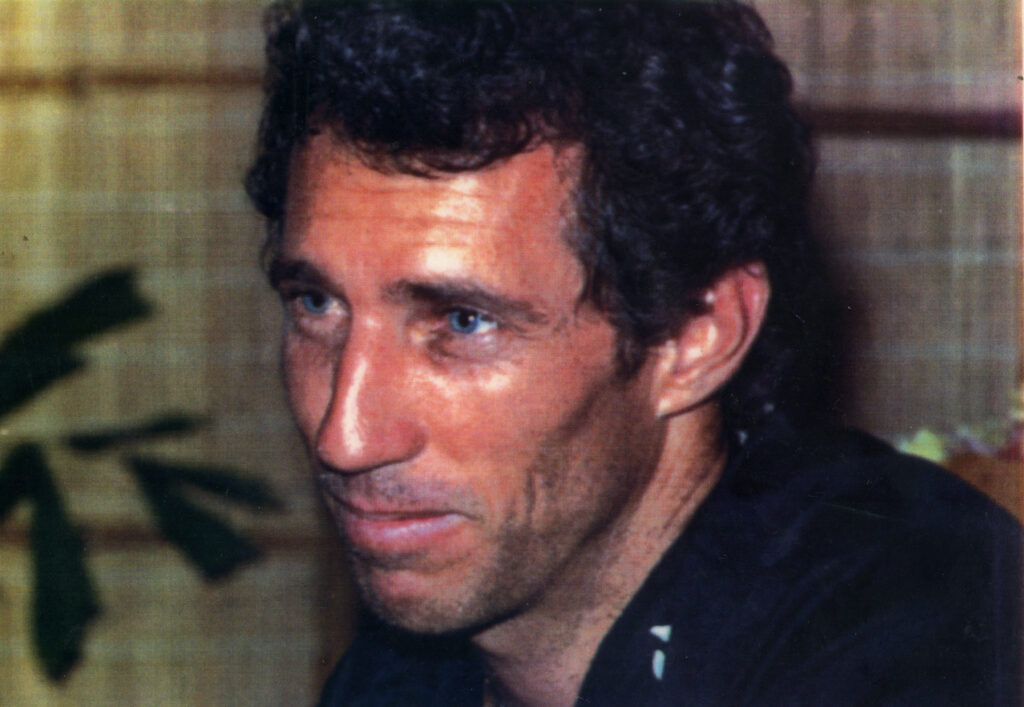
Great internal happiness is attained by this chanting process as the soul is gradually restored to its natural condition. The reason that these mantras are so powerful and have such a purifying effect on our consciousness is because as holy names of the Supreme Spiritual Being, they are invested with all of His transcendental potency. They are all-pure and all-purifying. The Padma Purana, one of the Vedic yoga texts, states:
The holy name of Krishna is transcendentally blissful. It bestows all spiritual benedictions, for it is Krishna Himself, the reservoir of all pleasure. Krishna’s name is complete, and it is the form of all transcendental mellows [or flavours of love]. It is not a material name under any condition, and it is no less powerful than Krishna Himself. Since Krishna’s name is not contaminated by the material qualities, there is no question of its being involved with maya [illusion]. Krishna’s name is always liberated and spiritual; it is never conditioned by the laws of material nature. This is because the name of Krishna and Krishna Himself are identical.
[Padma Purana. Quoted Caitanya-caritamrta Madhya 17:133]
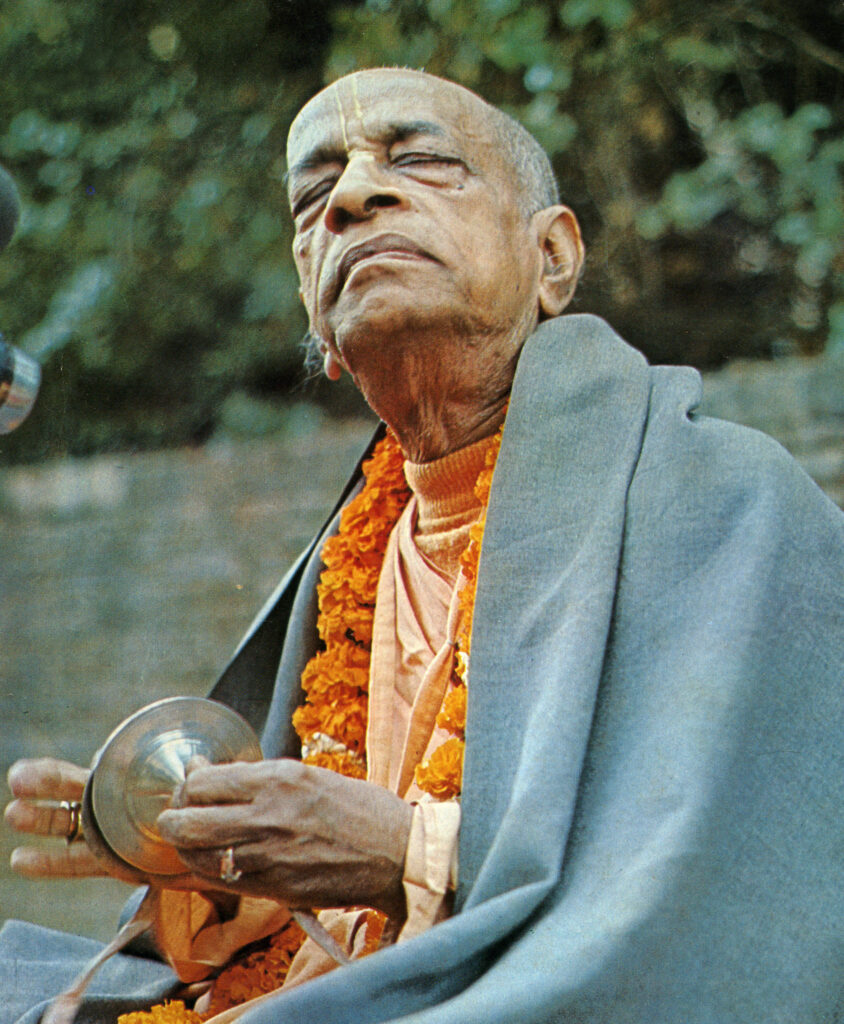
I could go on and on about how much this chanting process has given me, but that won’t really help you if you don’t apply it yourself. As they say, “The proof of the pudding is in the eating!” and you have to taste it yourself. We are doing this because we get great happiness from it and we want to share that happiness. That is another thing about this kirtan process – it softens one’s heart and makes us care for others. This is an integral part of the bhakti yoga process – the awakening of spiritual love.
Without this experience of inner spiritual happiness, the mind will always be looking for something new to fill up the emptiness. Thus, we are always hankering after what we haven’t got, fearing we’ll lose what we have and lamenting for what we once had and lost. If we are not acting on the spiritual plane, there is no solid enduring platform for the soul to rest and feel secure, peaceful and happy.
Sometimes we see children playing on the beach building sandcastles. They take it so seriously. They get so engrossed in it. And the adults laugh to themselves – they know that the tide will soon come in and wash the castles away. But in eternity, what is the difference between a child spending a few hours building sandcastles on the seashore and an adult spending a few decades trying to make a permanent home in this world, only for the tide of time to come in and wash away their life’s work. As Jesus taught, we need to build on the rock and not upon the sand. What is that rock, that lasting platform that will exist beyond the ravages of time? It is the spiritual happiness of yoga – the loving union of the individual soul with the Supreme Soul. Our home in this life is simply a transit lounge in eternity.
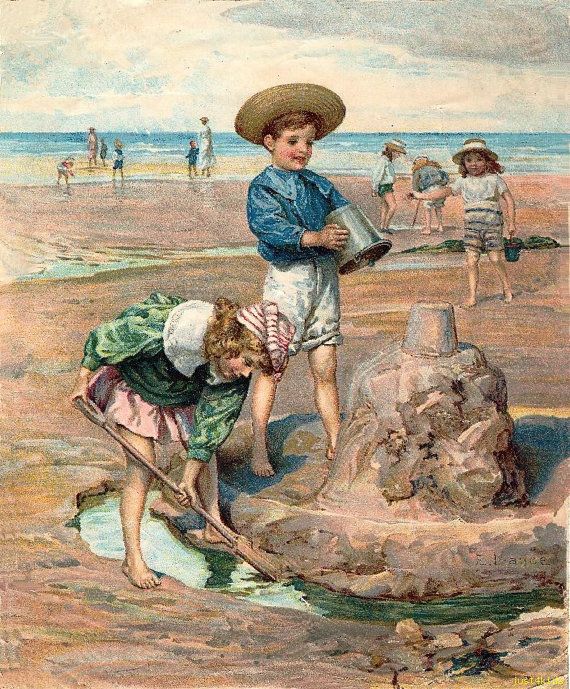
A lifetime goes very quickly – from the cradle to the grave in a lightning flash – as some poet put it. And the older you get the more you become aware of the sands of time rapidly flowing through the hourglass. Now I am approaching seventy, and if we were our material bodies then I would have to feel I am on the downhill slide. My senses are all blunted and gradually weakening, my body can’t do the things that it used to do to gain material pleasure. But I have never been happier, more peaceful or more optimistic about the future – not the future of this body but my future as an eternal spiritual being. I know I am spirit soul. I know I am eternal. I know I will exist beyond this temporary bodily existence; and I know that what gives me peace and happiness – my relationship with the Supreme Soul – is ever-existing and cannot be taken away from me. This is real freedom and real security beyond the ever-changing, shifting sands of material life.
There is a beautiful prayer by Bhakivinoda Thakur, describing the happiness of his old age. He was a great spiritual teacher in our disciplic line who left this world in 1914:
I have become supremely joyful by surrendering myself at Your holy feet. Unhappiness has gone away, and there are no more anxieties. I see joy in all directions. Your two lotus feet are reservoirs of immortal nectar where one may live free from sorrow and fear. I have found peace there now and have given up the fear of worldly existence. I shall render service in Your household and not endeavour to enjoy the fruits of that service, but rather I shall strive for whatever pleases You, fully devoted to Your lotus feet. Troubles encountered in Your service shall be the cause of great happiness, for in Your devotional service joy and sorrow are equally great riches. Both destroy the misery of ignorance. I have completely forgotten all past history by feeling great joy in my mind. I am most certainly Yours, and You are indeed mine. What need is there of any other treasure? Bhaktivinoda, diving into the ocean of bliss, devotes all his efforts for Your service and dwells in Your house according to Your wishes.
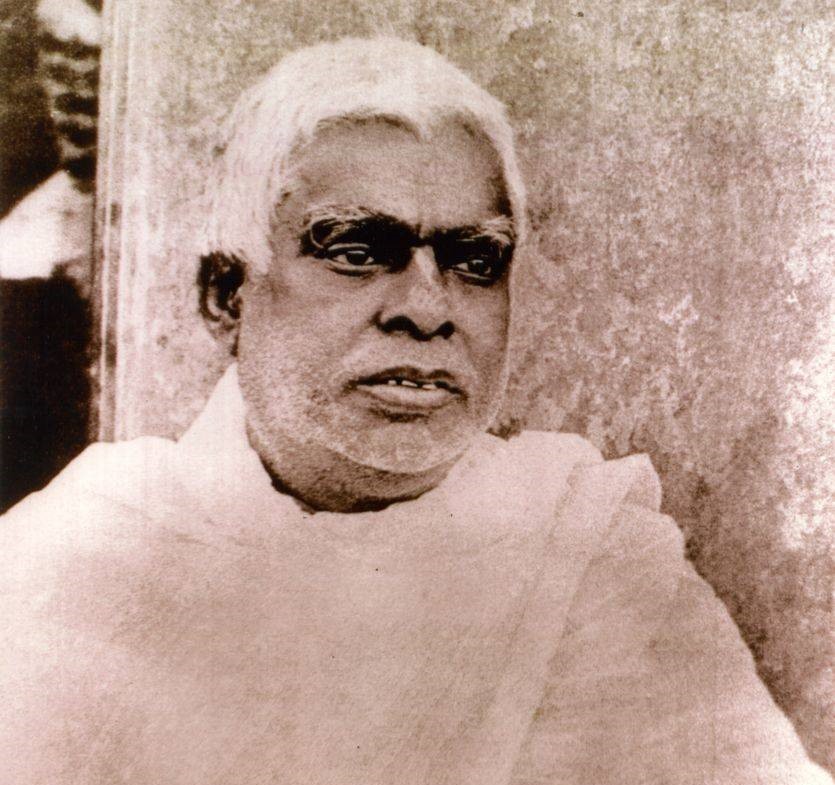
Personally,I sometimes feel I am on a production line heading towards death – and maybe I’m foolish but I don’t feel frightened, I feel that something wonderful awaits me and I’m having fun in the meantime. For one who is attached to the Supreme Soul, attached to chanting His names, what is dear to him cannot be taken away. For such a person, his happiness, his life’s purpose is transcendental – it transcends this material world and it transcends his material body. So, for him there is no fear – his transition from this life to the next is seamless. Because he has put himself in God’s hands, he feels safe and protected.
So, I am very grateful to my spiritual teachers, His Divine Grace A.C. Bhaktivedanta Swami Prabhupad who first brought this mantra meditation process to the west from India in the mid 1960’s. And to his perfect disciple, Jagad Guru Siddhaswarupananda, who has worked tirelessly in trying to spread this kirtan process worldwide. Motivated simply out of great compassion and love, they are giving this most wonderful and valuable gift of the sacred names of the Supreme to anyone willing to accept. They have never asked me for anything in return, apart from requesting that I pass on the gift to others. The happiness of great saintly teachers is in seeing us experiencing the greatest happiness of spiritual love for the Supreme Soul.
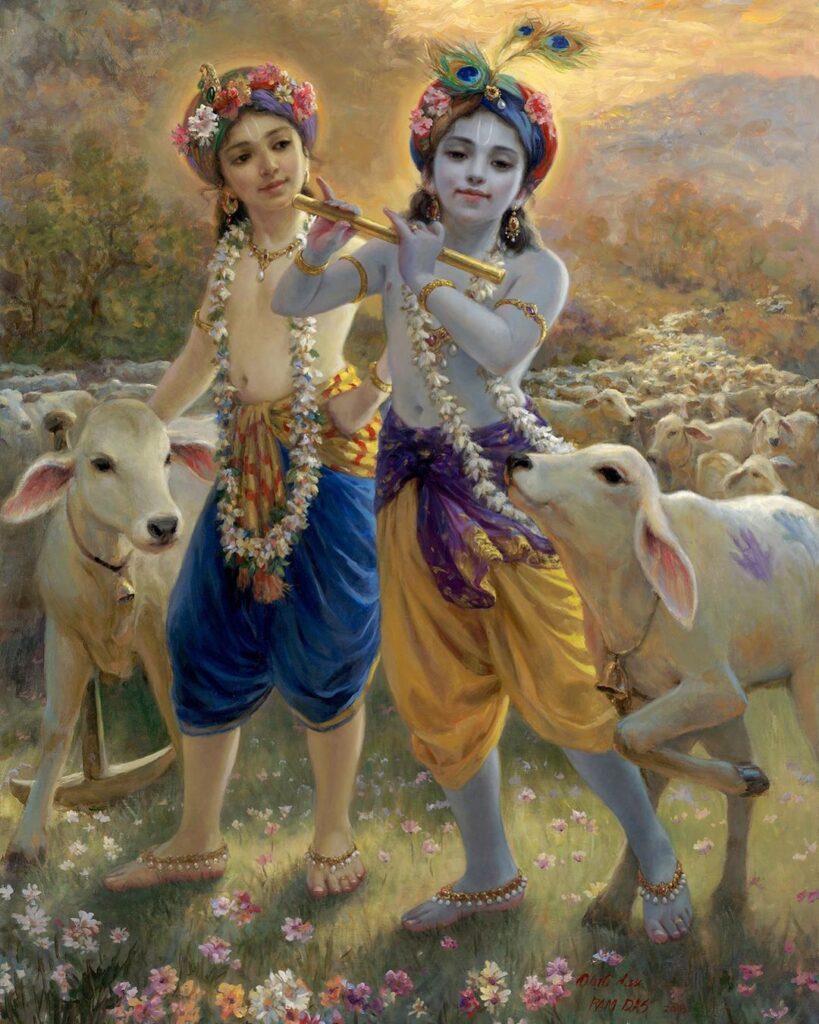


Leave A Reply